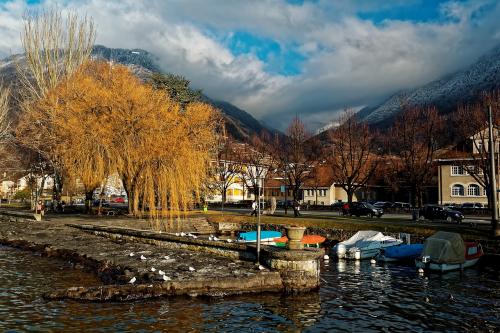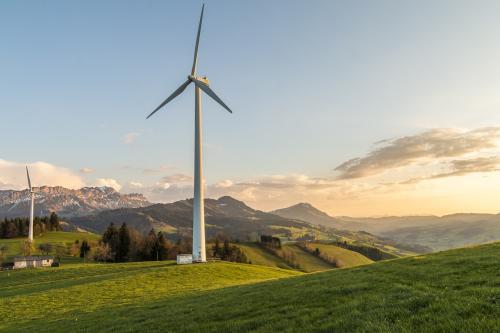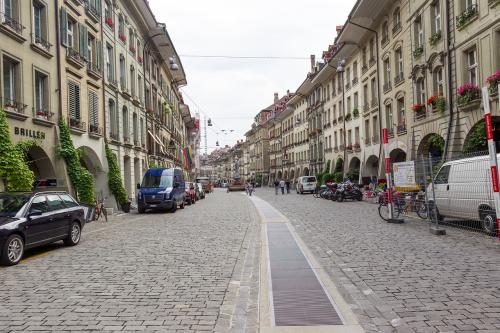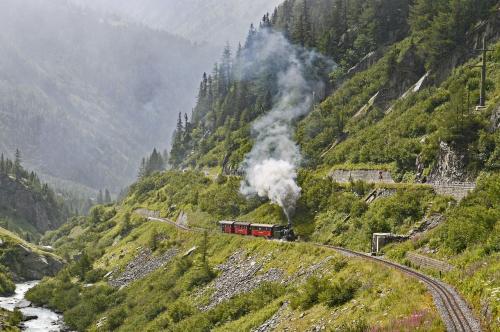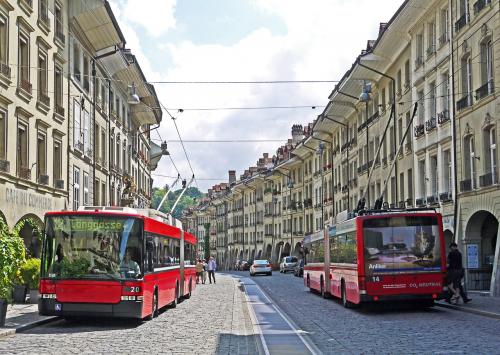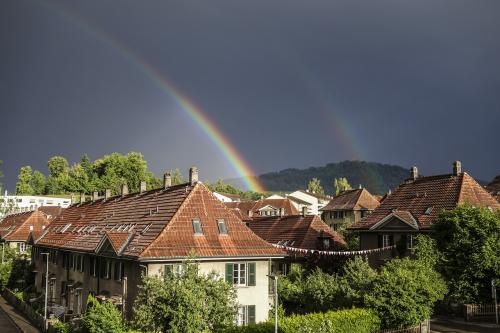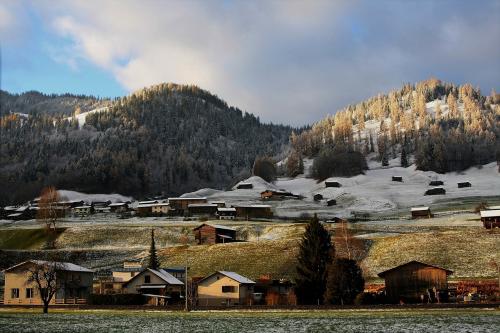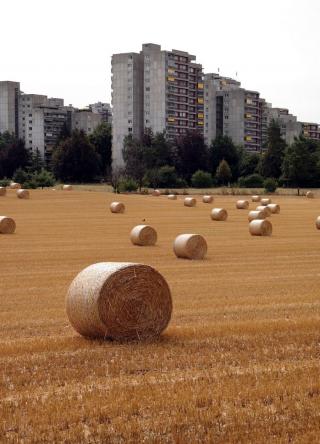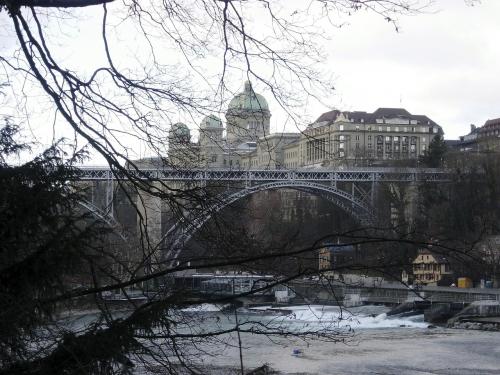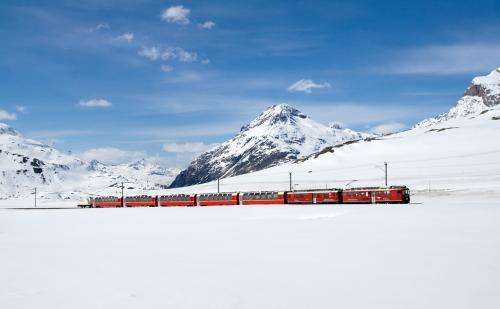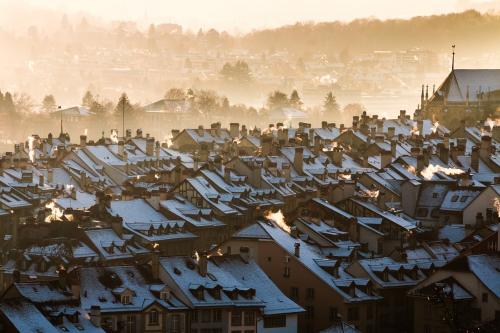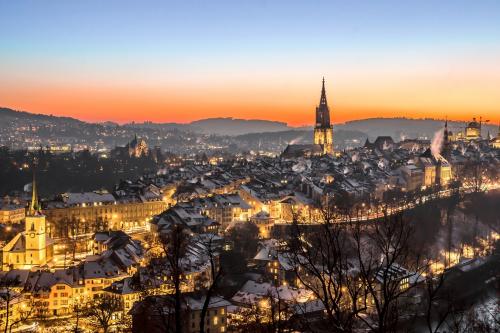Seasons in Switzerland
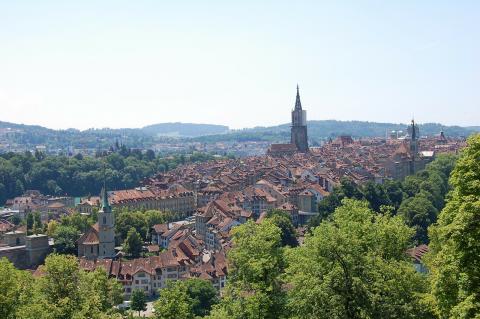
In general climate of Switzerland may be considered as temperate. Yet weather conditions of different parts of country vary due to variety of relief. Relatively flat north-western and central regions are under influence of Atlantics. East have alpine climate and habitats of southern parts are enjoying mild subtropical weather.
Significant portion of Swiss lands is covered with mountains. Naturally altitude affects weather. Average humidity levels are growing while temperature drops depending on altitude. Vast areas of Alpine Tundra are outlined with thin subarctic zones and dotted by rare ice-caps.
So Swiss winter appears to be pretty cold and snowy while summer is warm and rainy. Given that choosing most suitable season completely depends on type of planned activities such as skiing, sightseeing, eco-tourism and so on.
Seasons
Contents:
Spring in Switzerland
On plains of Switzerland spring starts with growing of average daily temperature up to 9°C (48°F). Geneva and Zurich are warmest cities and Berne is couple degrees colder. Mountainous areas are still freezy but in most resort cities temperature reaches above zero (above 32°F).
Weather of March is quite tricky. First week may start with shoots of grass but during following weeks will probably bring cold snap. One the other hand April brings constant warming. Especially to western and southern regions. Temperature reaches 14°C (57°F). But probability of showers increases to. So be sure to have umbrella when visit Switzerland at April.
At May tourist season starts in cities on plains. Most of ski resorts are closed by this time except some located in areas of ice-caps. For example Zermatt is still available at May. Average temperature of May is about 17°C (62°F).
Climate of the Spring Months
| March Max average t°: +9 °C (48 °F) Min average t°: 0 °C (32 °F) Sundial in the day: 8 hours Rainy days: 3 days Precipitation: 34 mm (1.3") |
| April Max average t°: +13 °C (55 °F) Min average t°: +3 °C (38 °F) Sundial in the day: 9 hours Rainy days: 5 days Precipitation: 59 mm (2.3") |
| May Max average t°: +17 °C (63 °F) Min average t°: +12 °C (45 °F) Sundial in the day: 10 hours Rainy days: 7 days Precipitation: 82 mm (3.2") |
(Berne)
Spring Holidays
1st March– Anniversary of the proclamation of the Republic.
1st April– April Fool’s Day.
Third Monday of April – Sechseläuten (Six-spoke) festivities.
First Thursday of April – Näfelser Ride.
1st May – Labor Day.
13 May– Mother’s Day.
Numerous Easter festivities.
Summer in Switzerland
Summer in Swiss valleys is rather humid season. Average temperature of northern and central regions is between 19 and 24°C (66-75°F). Southern regions are hotter with up to 32°C (89°F). But even the highest temperature is relatively comfort. Evening chill eases noon heat. So be sure to have light jacket even in the middle of Swiss Summer.
Numerous lakes of country are open at swimming season which begins in July. Lake Geneva has the coolest water of all with around 20°C (68°F). Lake Zurich is bit warmer: around 23°C (73°F). And Lugano is some kind of swimming paradise with its 26°C (79°F) degrees of temperature of water.
Also Summer in Switzerland is a time of numerous local festivities in many regions. So Summer is best time to go to Switzerland for cultural tourism.
Climate of the Summer Months
| June Max average t°: +21 °C (69 °F) Min average t°: +10 °C (51 °F) Sundial in the day: 11 hours Rainy days: 7 days Precipitation: 76 mm (3.0") |
| July Max average t°: +23 °C (74 °F) Min average t°: +12 °C (54 °F) Sundial in the day: 11 hours Rainy days: 6 days Precipitation: 81 mm (3.1") |
| August Max average t°: +22 °C (72 °F) Min average t°: +12 °C (54 °F) Sundial in the day: 11 hours Rainy days: 5 days Precipitation: 52 mm (2.0") |
(Berne)
Summer Holidays
29 June – Montreux Jazz Festival + Saint Peter and Paul.
19 July – Verbier Festival of classic music.
1st August – Confederation Day.
15 August – Assumption.
Autumn in Switzerland
September is the month with best weather conditions. Mild warmth and bright sky with fewer amounts of precipitations create best conditions for sightseeing, hiking or even simple wandering in cozy towns. Center of country may be showered by rather often rains and mountain may become covered with first snow.
October in Switzerland means real Autumn. It begins with gradual drop of temperature and gusty winds. Occasional showers and dull sky are accompanied by night frosts. Alpine regions are under reign of frequent snowfalls and cold.
November is not quite best time to visit the plain part country. Cities and towns are damp, dull and windy. Conditions on ski resorts are opposite – by the end of November starts skiing season. This means fluffy snow and comfortable rooms comparing to slushness of towns on plains.
Climate of the Autumn Months
| September Max average t°: +19 °C (77 °F) Min average t°: +10 °C (61 °F) Sundial in the day: 9 hours Rainy days: 4 days Precipitation: 53 mm (2.1") |
| October Max average t°: +14 °C (68 °F) Min average t°: +6 °C (54 °F) Sundial in the day: 8 hours Rainy days: 3 days Precipitation: 45 mm (1.8") |
| November Max average t°: +8 °C (61 °F) Min average t°:+1 °C (46 °F) Sundial in the day: 6 hours Rainy days: 4 days Precipitation: 52 mm (2.0") |
(Berne)
Autumn Holidays
Thursday after 1st Sunday in September - Genevan fast.
3rd Sunday in Septembe - Federal Day of Thanksgiving, Repentance and Prayer.
25 September - Saint Nicholas of Flüe Day.
28 September - Neuchatel Wine Festival.
31 October – Halloween.
Winter in Switzerland
In general Swiss Winter is cold but average temperature depends on altitude and location of certain region. Thus mountainous areas are coldest with frosty -10°C (14°F). Average temperature of northern plains is between -1 and -4°C (30-25°F), central – about 0°C (32°F) and in warmest southern regions about 4°C (39°F).
Almost all country is covered with snow. Of course highlands are snowier than plains. Amount of precipitations much higher as much as a risk of avalanches. For example average thickness of snow cover in Engelberg is about 3 meters (9.8 feet).
Among other weather conditions altitude influences probability of fogs. So its better to choose higher resorts to have sunny days on vacation.
Climate of the Winter Months
| December Max average t°: +4 °C (39 °F) Min average t°: -2 °C (29 °F) Sundial in the day: 5 hours Snowy days: 5 days Precipitation: 70 mm (2.8") |
| January Max average t°: +3 °C (37 °F) Min average t°: -3 °C (27 °F) Sundial in the day: 5 hours Snowy days: 6 days Precipitation: 68 mm (2.7") |
| February Max average t°:+5 °C (40 °F) Min average t°: -2 °C (29 °F) Sundial in the day: 6 hours Snowy days: 4 days Precipitation: 46 mm (1.8") |
(Berne)
Winter Holidays
6 December – St. Nicholas’s Day.
8 December - Immaculate Conception.
12 December – National Flag’s Day.
25 December – Catholic Christmas.
26 December - St Stephen's Day.
1 January – New Year.
2 January - St. Berchtold’s Day.
12 January –St. Moritz Gourmet Festival
8 February - Fasnacht carnival in Luzerne.
14 February – St. Valentaine’s Day.
15 February –Fasnacht carnival in Bern.
19 February – Fasnacht carnival in Basel.
 Seasons of the Year
Seasons of the Year 